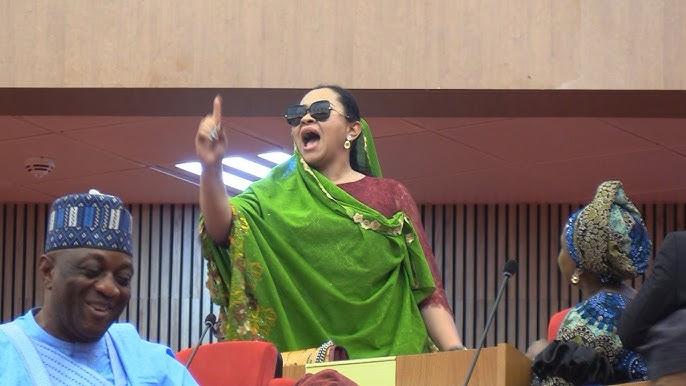The National Assembly, particularly the Senate, plays a crucial role in shaping the policies and governance of Nigeria. As the upper legislative chamber, the Senate is tasked with enacting laws, scrutinizing policies, approving national budgets, and holding the executive accountable.
Given the weight of its responsibilities, the Senate is expected to operate with decorum, professionalism, and a commitment to national progress.
However, recent events have highlighted instances where parliamentary proceedings have been overshadowed by theatrics and personal disputes, raising concerns about the integrity of the institution.
A recent incident involving Kogi Central Senator, Natasha Akpoti-Uduaghan, underscored this issue. The senator, elected under the Peoples Democratic Party (PDP), was involved in a heated dispute regarding her seating arrangement in the chamber. Following a reshuffling of seats due to opposition members defecting to the majority wing, Akpoti-Uduaghan refused to use the seat assigned to her, citing Order 10 of the Senate Standing Rules, which protects members’ privileges.
Her protest escalated when she loudly accused the leadership of attempting to silence her, exclaiming, “I don’t care if I am silenced. I am not afraid of you. You have denied me my privilege.” The situation nearly led to her removal from the chamber by security, but intervention from fellow lawmakers prevented further escalation.
Reacting to the incident, Senate spokesperson Yemi Adaramodu criticized Akpoti-Uduaghan’s actions, stating that the National Assembly is not a platform for entertainment but a place for serious governance. “What we are saying is that the National Assembly is not for content creation in entertainment. The National Assembly is for serious business,” he remarked in an interview on Channels Television’s Sunrise Daily.
Adaramodu further pointed out that Akpoti-Uduaghan had been granted significant responsibilities within the Senate. Despite being a first-term senator, she was appointed chairperson of three committees, including Foreign Affairs and Non-Governmental Organizations.
He refuted claims that she was being sidelined, emphasizing that her appointment to multiple key committees demonstrated the Senate’s recognition of her capabilities.
The spokesperson also confirmed that Senator Isah Jubril, Akpoti-Uduaghan’s colleague from Kogi State, had apologized on her behalf. The Senate, he noted, had accepted the apology and did not intend to pursue further disciplinary action against her.
The Senate’s Role in Governance
The Nigerian Senate is designed to be a platform for deliberation on national policies, not a stage for personal grievances. Its core functions include:
- Legislative Duties – The Senate is responsible for making laws that shape the socio-economic and political framework of the country. It is expected to debate bills with depth and seriousness, considering their long-term impact on governance.
- Oversight Responsibilities – Senators are tasked with holding the executive arm of government accountable. This includes investigating public institutions, reviewing government expenditures, and ensuring transparency in governance.
- Appropriation and Budgeting – One of the Senate’s most significant responsibilities is approving the national budget. Decisions made in the chamber directly impact economic planning, infrastructure development, and social programs across Nigeria.
- Foreign Affairs and Treaties – The Senate plays a crucial role in ratifying international treaties and agreements. It also collaborates with foreign entities to shape Nigeria’s diplomatic relationships.
Given these weighty responsibilities, it is imperative that the Senate maintains a high level of professionalism and decorum. While disagreements and debates are natural in a democratic setting, they must be conducted within the framework of parliamentary rules and mutual respect.
The Danger of Theatrics in the Senate
Incidents like the recent dispute involving Akpoti-Uduaghan risk diminishing public confidence in the Senate.
The chamber is not meant to be a battleground for personal interests but a forum for constructive dialogue and decision-making. Theatrics and disruptions not only waste legislative time but also distract from pressing national issues such as economic growth, security challenges, and infrastructural development.
When legislators engage in unnecessary disputes, the focus shifts from governance to sensationalism.
This undermines the credibility of the institution and fuels public disillusionment with the political process. Nigerian citizens expect their representatives to prioritize national progress over personal grievances.
Upholding the Integrity of the Senate
For the Senate to function effectively, it must uphold principles of discipline, respect, and national interest. Senators must approach their roles with the seriousness they demand, ensuring that parliamentary debates remain constructive and policy-driven.
Senate leadership also has a role to play in enforcing order within the chamber. Clearer guidelines on conduct and dispute resolution mechanisms can help prevent unnecessary disruptions. Furthermore, the media should focus on legislative achievements rather than amplifying sensational incidents that do not contribute to national development.
As Nigeria continues to face significant economic and security challenges, the country needs a Senate that is focused on delivering results. Political theatrics may generate headlines, but they do little to advance the well-being of citizens. The chamber must remain committed to the principles of democracy, governance, and accountability.
The Nigerian Senate is a vital institution in the country’s democracy, with the responsibility of shaping policies that affect millions of lives.
While robust debate and passionate advocacy are essential components of legislative work, they must be conducted within the framework of respect, decorum, and national interest.
Incidents like the recent dispute over seating arrangements should not define the Senate’s image. Instead, lawmakers must strive to uphold the integrity of the chamber and ensure that it remains a place for serious governance rather than unnecessary drama.
Only by maintaining focus and discipline can the Senate effectively serve the people of Nigeria and contribute to the country’s progress.

